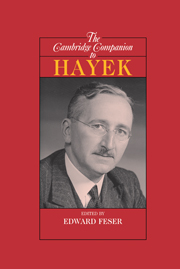Book contents
- Frontmatter
- Introduction
- 1 Hayek and the Austrian tradition
- 2 Hayek on money and the business cycle
- 3 Hayek and market socialism
- 4 Hayek and Marx
- 5 Hayek versus Keynes: the road to reconciliation
- 6 Hayek on knowledge, economics, and society
- 7 Hayek and Popper: the road to serfdom and the open society
- 8 Hayek’s politics
- 9 Hayek the philosopher of law
- 10 Hayek and liberalism
- 11 Hayek and conservatism
- 12 Hayek on the evolution of society and mind
- 13 Hayek on justice and the order of actions
- 14 Hayek the cognitive scientist and philosopher of mind
- Guide to Further reading
- Bibliography
- Index
10 - Hayek and liberalism
Published online by Cambridge University Press: 28 January 2007
- Frontmatter
- Introduction
- 1 Hayek and the Austrian tradition
- 2 Hayek on money and the business cycle
- 3 Hayek and market socialism
- 4 Hayek and Marx
- 5 Hayek versus Keynes: the road to reconciliation
- 6 Hayek on knowledge, economics, and society
- 7 Hayek and Popper: the road to serfdom and the open society
- 8 Hayek’s politics
- 9 Hayek the philosopher of law
- 10 Hayek and liberalism
- 11 Hayek and conservatism
- 12 Hayek on the evolution of society and mind
- 13 Hayek on justice and the order of actions
- 14 Hayek the cognitive scientist and philosopher of mind
- Guide to Further reading
- Bibliography
- Index
Summary
In particular you should not assume that in times of crisis exceptions should be made to principles
– F. A. Hayek, “The Rediscovery of Freedom”F. A. Hayek occupies a peculiar place in the history of twentieth-century liberalism. His influence has, in many respects, been enormous. The Road to Serfdom, his first political work, not only attracted popular attention in the west but also circulated widely (in samizdat form) in the intellectual underground of Eastern Europe during the years between the end of the war and the revolutions of 1989. His critique of central planning has been thoroughly vindicated, if not by the demise of communist economic systems, then at least by the recognition by socialists of many stripes of the importance of market processes. Books and articles on his thought continue to appear and there is plenty of evidence that his ideas are widely discussed in Europe, South America, and even in the United States. Hayek's political influence has been no less remarkable. He persuaded Antony Fisher to abandon his plans for a political career and to devote himself instead to establishing an organization for the dissemination of classical liberal ideas. The Institute of Economic Affairs founded by Fisher not only played an important role in changing the policymaking climate in Britain but also became the model for many classical liberal ”think-tanks” around the world. But Hayek also influenced political leaders and activists more directly through his writings and public speeches, and also through personal correspondence. By any reasonable standard, Hayek has been a significant public intellectual whose influence has roamed across the disciplines of social science into the realms of public policy.
- Type
- Chapter
- Information
- The Cambridge Companion to Hayek , pp. 182 - 207Publisher: Cambridge University PressPrint publication year: 2006
- 5
- Cited by



